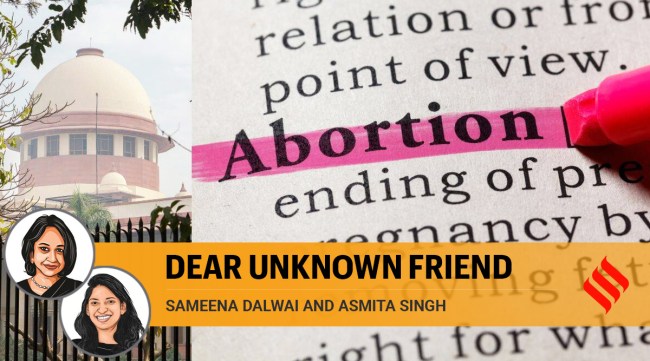Opinion In a society that defines women by marital status, can the Supreme Court judgment on abortion make a difference?
Sameena Dalwai and Asmita Singh write: Ultimately, the issue pertains to citizenship. Are women citizens of India? Or are we waiting to be enrolled?
 An unmarried woman does not have an owner. Who owns her womb then? Who do the children belong to? It causes confusion and disorder. Women’s sexuality is seen as a cause of disharmony. Remember Kunti told all her sons to share Draupadi equally?
An unmarried woman does not have an owner. Who owns her womb then? Who do the children belong to? It causes confusion and disorder. Women’s sexuality is seen as a cause of disharmony. Remember Kunti told all her sons to share Draupadi equally? Congratulations on your victory in the Supreme Court.
We are delighted and disheartened at the same time. The journey towards becoming citizens is slow and arduous for women. Your victory has not been propelled by the constitutional rights of women citizens. You were lucky to be in a progressive courtroom. The Division Bench of the Delhi High Court had earlier refused you an abortion with the remark: “We will ensure that the girl is kept somewhere safe and she can deliver and go. There is a big queue for adoption.” It’s ironic that men are sitting on judgment on the rights of women to their own bodies. We thank you for your courage in representing all of us as the only woman facing male judges, male lawyers and the predominantly male ethos of the law.
We have to fight more battles. Section 3(g) of the Medical Termination of Pregnancy (Amendment) Act talks about “women with pregnancy in humanitarian settings or disaster or emergency situations as may be declared by the government.” What if the government does not recognise a particular situation as a humanitarian crisis? Consider women from Manipur, Kashmir or Gujarat 2002. What happens when the nexus of political agenda and bureaucracy ensures a stark difference between reality and official data?
The judgment expands the definition of rape to marital rape for the MTP Act. Marital rape is still not criminalised. If society does not accept “marital rape” as even a moral offence, how will a woman convince doctors to terminate her pregnancy based on the exception provided by the SC’s verdict? The tyranny of social norms and value systems is stronger than legislative intent.
The distinction between marriage and unmarried women is built into the Hindu ethos. Married women have a different world — attire, jewellery, rituals — compared to widows or unmarried or deserted women. Celebrations like Haldi Kumkum, Godbharai and Karva Chauth are only for them. So is the right to sexual intercourse.
In contrast, unmarried women do not have a right to sex. How can they get pregnant, then? So what does the right to terminate pregnancy mean for them? Denial of the right to abortion then is the mirror image of the refusal to criminalise marital rape. Unmarried women cannot have sex, married women cannot say no to sex because men own women’s sexuality.
A Hindu marriage is a sacrament, a sanskar. A virgin daughter is given to a groom of the same caste. Kanyadaan, thus, is a transaction between the father, the giver, and husband, the taker. The kanya is merely a gift. Her consent is immaterial to the ritual. Can the gift then decide how it is to be used?
Husbands can use the legal remedy of “restitution of conjugal rights” against runaway wives. Ownership is integral here. Since the 1950s, the courts have struggled to do justice to women caught in unhappy marriages. In T Sareetha v Venkata Subbaiah (1983), the Andhra Pradesh HC said that compelling a woman to have sexual intercourse deprives her of control over her own body. But the Delhi HC in Harvinder Kaur v Harmander Singh Choudhary (1984) and the Supreme Court in Saroj Rani v Sudarshan Kumar Chadha insisted that marital “consortium” defined as “companionship, love, affection, comfort” is more crucial and “living in the same household does not compel couples to have sexual intercourse”. As if men want their wives back for chats and walks.
An unmarried woman does not have an owner. Who owns her womb then? Who do the children belong to? It causes confusion and disorder. Women’s sexuality is seen as a cause of disharmony. Remember Kunti told all her sons to share Draupadi equally? Because she understood that they all desire her and that could lead to fights amongst the brothers. Infighting is “fitna” in Arabic — women can cause it by their mere presence, visibility of their body parts or hair. Clearly it is easier to cover women in hijab, naqab, chador than expect men to control their sexual urges.
In societies with such ethos, free and autonomous women cause trouble. They challenge familial ideologies and threaten state ideologies based on family, caste, and religion.
Ultimately, the issue pertains to citizenship. Are women citizens of the country? Or are we waiting to be enrolled?
Dalwai is Professor, Jindal Global Law School and Singh is Assistant Professor, Jindal Global Law School






